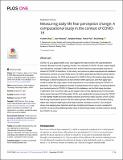Measuring daily-life fear perception change: A computational study in the context of COVID-19
Author(s)
Chai, Yuchen; Palacios, Juan; Wang, Jianghao; Fan, Yichun; Zheng, Siqi
DownloadPublished version (1.490Mb)
Publisher with Creative Commons License
Publisher with Creative Commons License
Creative Commons Attribution
Terms of use
Metadata
Show full item recordAbstract
<jats:p>COVID-19, as a global health crisis, has triggered the fear emotion with unprecedented intensity. Besides the fear of getting infected, the outbreak of COVID-19 also created significant disruptions in people’s daily life and thus evoked intensive psychological responses indirect to COVID-19 infections. In this study, we construct a panel expressed fear database tracking the universe of social media posts (16 million) generated by 536 thousand individuals between January 1st, 2019 and August 31st, 2020 in China. We employ deep learning techniques to detect expressions of fear emotion within each post, and then apply topic model to extract the major topics of fear expressions in our sample during the COVID-19 pandemic. Our unique database includes a comprehensive list of topics, not being limited to post centering around COVID-19. Based on this database, we find that sleep disorders (“nightmare” and “insomnia”) take up the largest share of fear-labeled posts in the pre-pandemic period (January 2019-December 2019), and significantly increase during the COVID-19. We identify health and work-related concerns are the two major sources of non-COVID fear during the pandemic period. We also detect gender differences, with females having higher fear towards health topics and males towards monetary concerns. Our research shows how applying fear detection and topic modeling techniques on posts unrelated to COVID-19 can provide additional policy value in discerning broader societal concerns during this COVID-19 crisis.</jats:p>
Date issued
2022Department
Massachusetts Institute of Technology. Department of Urban Studies and PlanningJournal
PLOS ONE
Publisher
Public Library of Science (PLoS)
Citation
Chai, Yuchen, Palacios, Juan, Wang, Jianghao, Fan, Yichun and Zheng, Siqi. 2022. "Measuring daily-life fear perception change: A computational study in the context of COVID-19." PLOS ONE, 17 (12).
Version: Final published version